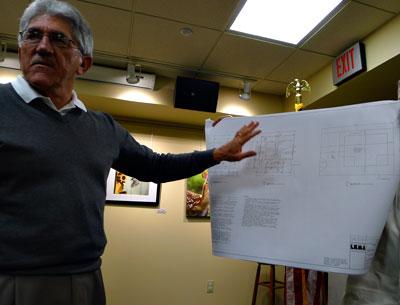Amagansett Restroom ‘Ready to Go’

The public restroom to be constructed in the parking lot north of Main Street in Amagansett is “ready to go,” East Hampton Town Supervisor Larry Cantwell told the hamlet’s citizens advisory committee on Monday night. Mr. Cantwell displayed the latest blueprints prepared by the architect, Joseph Catropa, which he said he considered the final design. The next steps, he told the committee, are to solicit bids, choose a contractor, and complete construction of the cedar-shingled building before next summer.
Concurrently, the lot is to be restriped, which will result in a small increase in the number of parking spaces. “It’s been vetted, the committee worked hard on it, and the architect did a good job of revising plans and putting it together,” Mr. Cantwell said. “We’re ready to go.”
Not everyone agreed. “It is probably way too late in this process,” Rachel Gruzen, an Amagansett resident, conceded before asking if the restroom “absolutely has to be in the location it is,” behind the library. The second floor of the library, where she and others often work for long periods, offers “the most extraordinary view,” she said. “All that common space was designed to look out over the fields.”
Tina Piette, whose law office is adjacent to the parking lot, also objected to the location, pointing out that the Suffolk County Department of Health Services’ approval of the restroom was for a site toward the west end of the lot. “Now I’m 50 feet, or 80 feet, whatever it is, but looking at a bathroom.”
“As far as I’m concerned, we’re ready to go with this,” Mr. Cantwell repeated. “Tina doesn’t want it in this location, I’m sure there are a few others. But I’ve worked on this now for nine months, and I think there was a strong consensus of opinion that this was the location.” The town, he said, will obtain Health Department approval for the spot as proposed. “There was strong consensus,” he reiterated. “In the center, as opposed to stuck in the corner.”
A proposed town law establishing a rental registry, which would require prospective landlords to provide detailed information about their houses and tenants, was also discussed. Several committee members stated that the law as drafted would punish the majority for the acts of a few who turn a blind eye to overcrowding and other code violations.
“It seems like overkill,” said Michael Diesenhaus, the committee’s vice chairman, “and like we’re asking a lot of people to go through a process to make sure that some people don’t take advantage of it.”
Jeanne Frankl, of the committee, disagreed. The discussion, she said, “should be reoriented a little bit from this idea of ‘Are we punishing people who have done no wrong?’ . . . We should be considering this from the vantage point of ‘Will it help us to enforce the law?’ Maybe that requires a little more investigation than has yet been made of why the law isn’t being enforced.”
There was a point at which one simply wanted to be left alone, Mr. Diesenhaus said. “My difference with you is, now we’re talking about your home. If a couple hundred people per summer are nuisances, that’s not a high enough bar for me for crossing the Rubicon to now having everybody be in a process.”
“We’re still in the informational stage,” Mr. Cantwell said, acknowledging that the proposed law has drawn much criticism. “There are those people who perceive this as an unnecessary intrusion.” Contractors, for example, are required to be licensed, he said, and to include that license number when advertising their services.
Similarly, the proposed law would shift the burden of proof toward the homeowner, he said. A house with two mailboxes or utility meters, for example, might lead to a presumption of violation. “People object to the collection of information,” the supervisor said. “They feel it’s an imposition on their privacy. But the flip side is, there’s a database. If there’s an absentee landlord that lives someplace else, there is contact information.”
Mr. Cantwell acknowledged insufficient code enforcement efforts, but said that the town budget for the coming year allows for an additional officer and that another building inspector has recently been hired. “I’ve worked hard to try to get the code enforcement units of the town to work together,” he said — the building inspector, code enforcement officers, police, and fire marshal. “We’re trying to fill in the void and are doing the hirings as quickly as we can.”
Proposing and vetting a rental registry, Mr. Cantwell said, was a first step “to see whether or not this was something the community would support. There are a lot of questions to be answered. The last thing you want to do is create a system where it turns into a useless bureaucracy that bogs down and frustrates everybody.”
